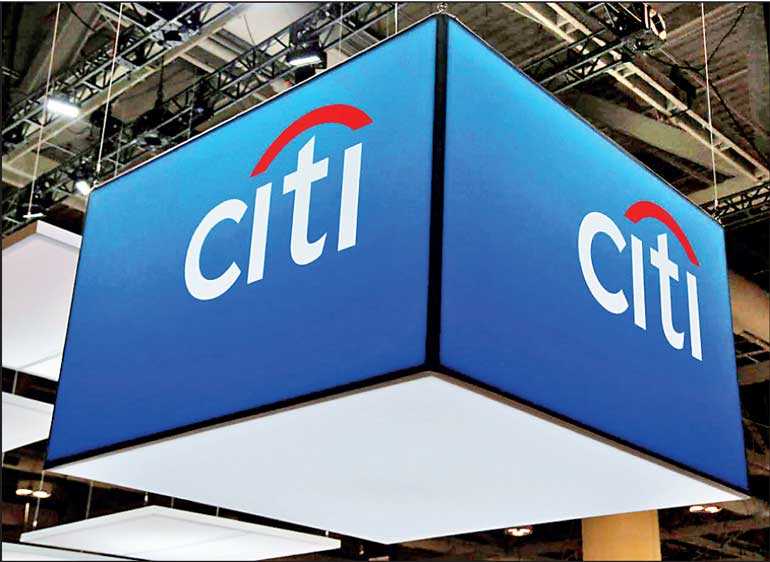Saturday Feb 28, 2026
Saturday Feb 28, 2026
Wednesday, 16 January 2019 00:00 - - {{hitsCtrl.values.hits}}

Reuters: Citigroup Inc said it would earn $2 billion more in revenue from its lending activities this year than in 2018 as it reported better than expected fourth-quarter earnings, sending its shares more than 4% higher.
Chief Financial Officer John Gerspach pointed to growing revenue from its consumer banking business and a reduced government surcharge for deposit insurance, as drivers for net interest income this year.
More broadly, the US economy remained strong, and global economies are doing well, he said. He noted that slower economic growth in China was not hurting the bank’s operations.
“Take a look at the US. Unemployment is at virtually all-time lows, wages are moving forward, consumer confidence remains high,” he said on an earnings call.
The quarterly results beat Wall Street profit estimates as lower expenses offset a drop in quarterly revenue, stemming from year-end volatility in its fixed-income trading business.
Citi is the first of the major US banks to report fourth-quarter results. Wall Street majors JPMorgan Chase & Co, Bank of America Corp and Goldman Sachs will report later this week.
Citi officials also said they had yet to see an effect on business from a partial US shutdown but that could change if the shutdown continues.
Excluding a one-time tax related gain, quarterly profit rose to $4.2 billion, or $1.61 a share, in the quarter ended 31 December, from $3.7 billion, or $1.28 a share, a year earlier. Analysts had expected a profit of $1.55 per share, according to IBES data from Refinitiv.
Shares of the third-largest US bank were up 4.5% at $59.23 in afternoon trading, reversing earlier falls after investors swiveled focus away from a 21% fall in revenue in its markets and securities business in the fourth quarter.
The bank cited widening credit spreads and the market correction in December for that fall.
Banks with big trading businesses benefit when markets move, because it prompts customers to buy and sell securities. But sudden bursts of volatility can be damaging, leading customers to avoid trading and also hurting banks’ ability to hedge their own market exposures.
Stock markets gyrated wildly in December and yield spreads, or the additional premium investors demand for holding corporate bonds over safer US Treasury securities, also widened significantly in the fourth quarter as investors globally fled risky investments.
Citi’s overall revenue fell 2% to $17.1 billion, below Wall Street expectations of $17.6 billion, according to IBES data from Refinitiv.
The bank said it reduced compensation costs as markets revenue lagged and that overall expenses declined 4% from a year earlier.
In fixed-income markets, CFO Gerspach said that for much of the quarter corporate and investor clients “remained on the sidelines, waiting for some clearer market conditions.”
The revenue decline hurt Citigroup’s effort to hit an efficiency target set by Chief Executive Officer Michael Corbat, though it exceeded his goal for returns on tangible common equity (ROTCE).
The bank reported an efficiency target of 57.4% for 2018, just shy of Corbat’s 57.3% goal. Its ROTCE of 10.9% last year was above the 10.5% target.
A lower efficiency ratio means a bank is better at managing its costs relative to revenue, while ROTCE is a widely watched measure of how well a bank uses shareholder money to generate profits.
Investors have been pushing Citigroup to prove it can grow revenue and profits, rather than simply returning capital through share buybacks. Skepticism over its potential to grow its underlying businesses hangs over its share price, with Citi trading at a lower valuation than rival US banks.
Last week the bank signed a deal with one of its largest shareholders, ValueAct, granting the activist investor more access to its board.
Earnings per share were also boosted by an 8% decline in outstanding stock as Citigroup bought back 74 million of its own shares.
Even though Citigroup returned more than 100% of its annual earnings through dividends and stock buybacks, the stock is still trading below tangible book value, Oppenheimer analyst Chris Kotowski noted in a report after the earnings release.